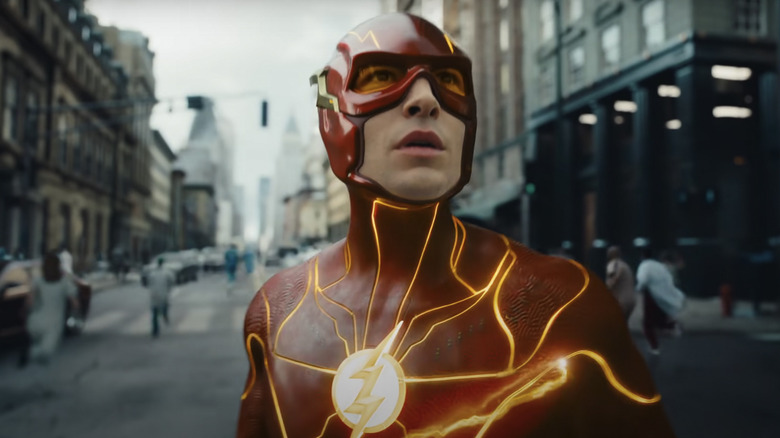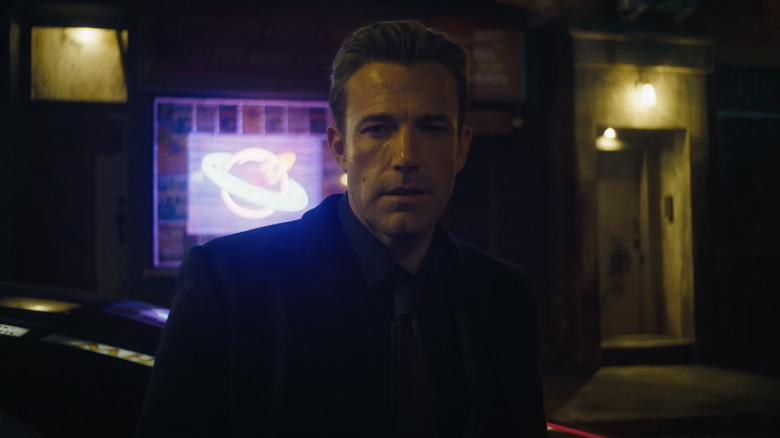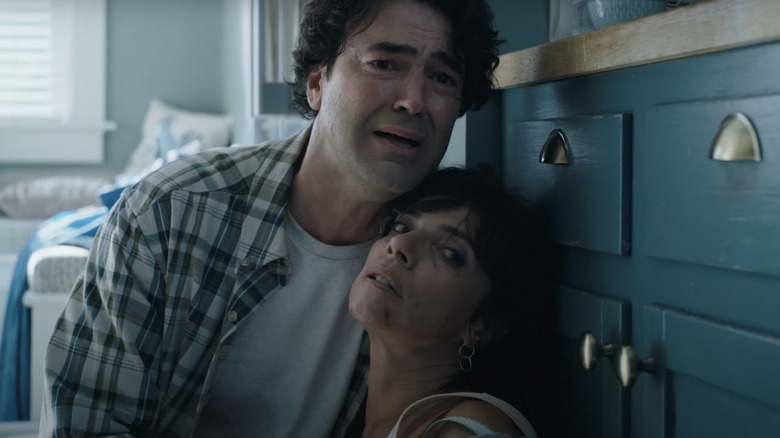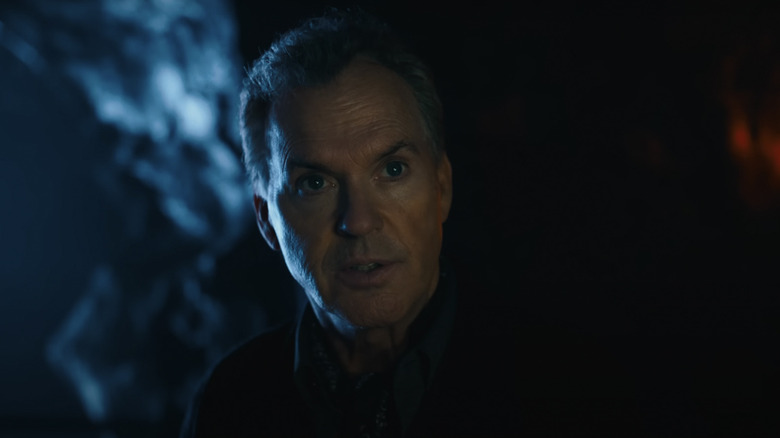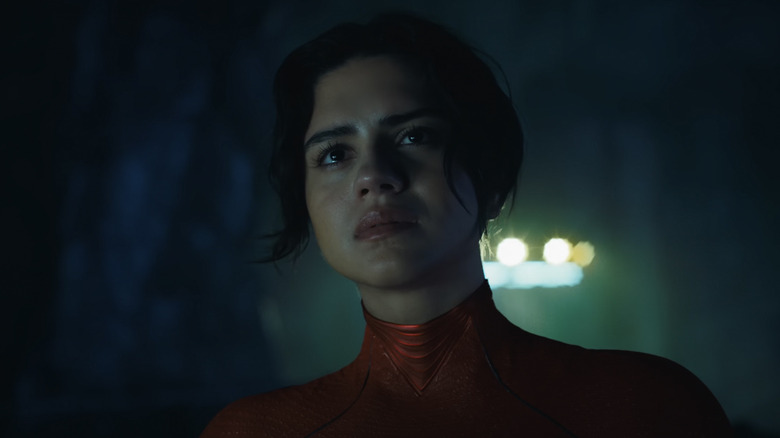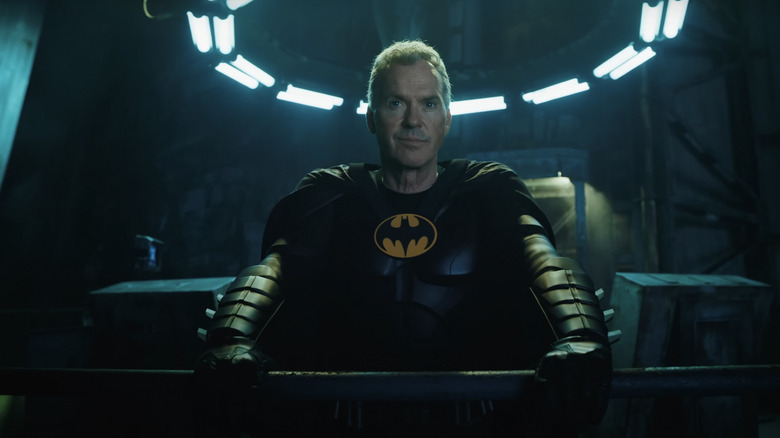The Flash Review: Ezra Miller And Michael Keaton Blast Through The Past
From its opening seconds, Andy Muschietti's "The Flash" is concerned with time.
It's ironic for a movie that's taken so many years to finally make it to the big screen, but the finished film makes the passage of time into of its main themes. If you have the ability to run faster than the speed of light and physically turn back the clock, what types of sacrifices would you be willing to make for those you care about?
In the first frames of the film, the Warner Bros. and DC logos zip through different historical versions as they blaze across the screen, indicators that this movie is interested in interrogating both the past and the present. Those hoping this film may be an ultra-serious remnant of the Snyderverse would do well to alter those expectations, because "The Flash" is, more than anything, a comedy, taking clear inspiration from not only the comics, but things like the "Back to the Future" and "Doctor Strange" franchises to tell its own multiversal story about what happens when Barry Allen (Ezra Miller, whose personal problems have in many ways overshadowed the film's production) disrupts the space-time continuum. The result is easily one of the best DC movies in recent history and an apparently necessary reminder that a single solid script is more important than any 10-year plan a studio may promise.
"The Flash" has issues, to be sure, but it's also undeniably entertaining, even with all of the off-screen antics that have suffused its production with an amount of baggage that's difficult to fully ignore. To the movie's credit, though, Ezra Miller does their darndest to make you forget about all of that by turning in the most crowd-pleasing performance of their career so far.
The janitor of the Justice League
Barry begins the movie as the self-proclaimed "janitor of the Justice League," cleaning up "Bat-messes" when Bruce Wayne (Ben Affleck) calls on him in times of need. The film opens with a spectacular sequence in which Barry is called in to save innocent civilians at a collapsing hospital in Gotham City; as Batman chases bad guys on the Batcycle (in somewhat boring fashion), a nurse and a number of babies careen out of a window as the hospital collapses (this is about as not-boring as it gets).
Barry jokingly refers to this as a "baby shower," and it's up to The Flash to save them and avoid catastrophe. The scene is very funny, slowed down and seen through Barry's ultra-fast POV as he breaks into a vending machine to boost his calorie count and give him enough energy to save the infants, who are all facing downright hilarious levels of danger. One is about to be stabbed in mid-air with glass shards, another is nearly impaled with knives, and a third sees a bottle of acid careening through space and heading straight for it. The film has almost instantly entered full-blown cartoon territory, and the creative solve to this seemingly impossible quandary feels like one of the only scenes in which Muschietti's twisted sense of humor is on full display. For my money, this is the best slow-mo superhero scene of all time, far surpassing the admittedly impressive Quicksilver sequences in the later-era "X-Men" movies.
But despite his heroics, Barry isn't fulfilled by his current position in life, and he soon discovers that he can run so fast that he can burst into a timeless netherworld where he finds himself in the center of a fascinating "Chrono Bowl," a sunken amphitheater which contains visual representations of all of his memories. Naturally, he's inspired to mess with the past, although Wayne, who knows a thing or two about loss, cautions Barry not to let his own tragedy define him. Unfortunately for the world, Barry does not immediately take that advice to heart.
Clearly defined motivations
He has a good reason for messing with the past (or at least an understandable one): Barry desperately wants to go back in time to save his parents. His mom (Maribel Verdú) was murdered in his childhood home when he was just a boy, and his dad (Ron Livingston) was pegged as the killer and thrown behind bars, even though Barry knows his father is innocent. Livingston makes the most out of his very limited screen time, imbuing his character with empathy and kindness even though his situation seems totally hopeless. In flashbacks, Verdú also does a lot with a little as Barry's mom, providing an emotional anchor for a movie that's saddled with some huge storytelling gymnastics over the course of its runtime.
Barry has dedicated his adult life to freeing his father, sacrificing his own personal life and spending hours poring over books to find a possible loophole. But a lack of evidence means his dad's window of opportunity is quickly closing, and Barry can't take the idea of losing both of his parents. He reconnects briefly with Iris West (Kiersey Clemons), a journalist and old college friend on whom he has a crush, but this movie is less focused on Barry's potential love life than tracking what happens when he inevitably screws up the timeline by trying to save his parents.
Micheal Keaton returns
Barry's attempt to alter the past has far-reaching consequences, with him ending up in the past of an alternate timeline where he has to interact with his 18-year-old self (played by a longer-haired Miller). Things go very wrong, and when Zod (Michael Shannon) shows up to terraform the Earth, Barry realizes things aren't going to go down the same way we saw in the previous movies because this universe is so different. In an effort to reunite the Justice League, he meets up with Bruce Wayne, played now by fan favorite Michael Keaton, who seems to relish being able to return to one of his most famous roles. Keaton has the opportunity to play several different shades as this iteration of Batman: Long-haired burnout, stoic straight man to the two Barrys, reluctant savior, action hero, and inspiring leader. He connects with Barry over their similar traumas but also gets his version of the Darth Vader in "Rogue One" hallway moment in a Russian facility mid-way through the movie, where his Batman takes out a number of soldiers in ways that will delight whooping fanboys who have been aching to see this Dark Knight in a modern fight scene.
There are plenty of callbacks to lines and moments from his two-film Bat-run from '89 to '92, and while some fans will scream and point at the screen when he repeats memorable lines from those films, it doesn't always make narrative sense for this version of the character to do so. If you're like me and are generally allergic to this type of cringy and pandering fan-baiting, you'll have to hold your nose and endure a few eye-rolling instances of it here.
Still, as obnoxious as I tend to find those moments, I think the fact that I came away from this film still feeling positive about it says something about the overall quality of the rest of the movie, and indicates that these nudges and winks don't sink the whole vibe like they have for some other films.
Supergirl joins the team
For reasons I won't spoil here, Supergirl (Sasha Calle) factors into the action this time as well, and Calle brings a ferocity to the character that hasn't been seen in a live-action portrayal before. She doesn't trust humanity, but knows she and her new friends must face off against Zod in order to save the planet. Their climactic conflict, featured heavily in the trailer, takes place in the middle of an empty desert, hinting that Muschietti heard audience complaints about all the city-wide collateral damage from Superman and Zod's fight in Zack Snyder's "Man of Steel" and that the director is using this opportunity to try to provide an alternate version of events that may be more palatable to those who think about things like that when watching superhero movies.
The director brings some inventive visuals to the action, including an extended sequence of Barry speeding from his home of Central City to Gotham early in the movie, with the camera slowly spinning around Barry at a distance as he blasts through the streets and the world bends around him as he traverses the area. While the third act does devolve into a lot of CG nonsense, the visual inventiveness of the Chrono Bowl and the creative staging of some of the slow-motion sequences go a long way toward making this film an enjoyable experience. And the integration of the two Barrys feels seamless: The two versions of Miller interact with each other in impressive, natural ways that almost make you forget how much work must have gone into filming those scenes.
Closing thoughts
"The Flash" contains pop culture references, cameos, and Easter eggs galore — juicy moments people are definitely going to be talking about, and ones that will absolutely be spoiled online on opening night. Your mileage may vary on how well those work for you (most general audiences will surely be left baffled by one particular cameo that only hardcore DC fans or regular movie news readers will understand), but again, the fact that the movie can withstand all of these diversions and still maintain a strong emotional core is a testament to the power of the script by Christina Hodson, John Francis Daley & Jonathan Goldstein, and Joby Harold.
Some jokes work better than others, but overall, the film has a pretty high success rate on that front as well. The filmmakers know that two Barrys interacting might be a bit much for some viewers, given this character's socially awkward but motormouthed persona, so they comment on it in the film itself to get ahead of that criticism. While I rarely laughed out loud, I did find many of the comedic moments to be amusing, which is saying something when a film is pitched at this specific frequency for so much of its runtime.
While I have a few complaints and there are a couple of head-scratching loose ends, "The Flash" is still a funny, emotional, action-heavy crowd-pleaser that ranks among the best DC movies ever made. Stay tuned to /Film after the film's release, because there is an abundance of angles to discuss once we can talk freely about spoilers.
/Film Rating: 7.5 out of 10
